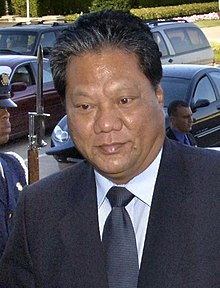Kessai Hesa Note | |
|---|---|
 Note in 2005 | |
| 3rd President of the Marshall Islands | |
| In office 10 January 2000 – 14 January 2008 | |
| Preceded by | Imata Kabua |
| Succeeded by | Litokwa Tomeing |
| Speaker of the Nitijela | |
| In office 1988–1999 | |
| Preceded by | Atlan Anien |
| Succeeded by | Litokwa Tomeing |
| Personal details | |
| Born | 7 August 1950 Ailinglaplap Atoll, Trust Territory of the Pacific Islands |
| Political party | UDP |
| Spouse | Mary Neimoj Yamamura |
Kessai Hesa Note (born August 7, 1950, in Ailinglaplap) is a Marshallese politician who was President of the Marshall Islands from 2000 to 2008.
Elected in 1979 alongside Litokwa Tomeing, Note is one of the two longest-serving members of Nitijeļā.[1] He was the Minister of Internal affairs from 1985 to 1986, and Minister of Transportation and communications from 1986 to 1987.[2] Having served as Speaker of the Nitijeļā since 1988,[3] he was elected president in 2000. Note is the first commoner, rather than an Iroijlaplap or traditional chief, to be elected to the Presidency.[4] He is a member of the United Democratic Party, and was reelected by parliament in January 2004, receiving 20 votes, while Justin deBrum received 9.
On January 7, 2008, following the November 2007 general election, he was defeated in his bid for re-election in a vote of Parliament, receiving 15 votes against 18 for Litokwa Tomeing.[4][5]

Note is of Japanese-Marshallese descent, having inherited his Japanese heritage from his paternal grandfather.[6] Note's grandfather was a native of Niigata Prefecture, and settled in the Marshall Islands during the Japanese colonial era and married a Marshallese wife.[7]
He was the Minister of Justice from 2020 to 2022.[8]
In February 2023, The Washington Post reported that Note is under investigation by the Marshall Islands' attorney general.[9] In December 2023, the United States Department of State barred Note from entering the US under the Global Magnitsky Act for accepting bribes.[10]
- ^ "Ruben made his mark on RMI". January 3, 2019. Archived from the original on October 17, 2020. Retrieved October 17, 2020.
- ^ "Nitijela of the Marshall Island: 3". Archived from the original on 2023-12-11. Retrieved 2020-11-01.
- ^ "Republic of the Marshall Islands". Archived from the original on 2019-01-09. Retrieved 2019-02-02.
- ^ a b Giff Johnson, "Opposition Takes Control Of Marshall Islands Government" Archived 2007-06-14 at archive.today, Pacific Magazine, January 7, 2008.
- ^ "Litokwa Tomeing becomes new Marshalls president". Radio New Zealand International. 7 January 2008. Archived from the original on 13 November 2013. Retrieved 12 October 2011.
- ^ "ケーサイ・ノート マーシャル諸島共和国大統領略歴". Archived from the original on 2016-03-03. Retrieved 2007-12-30.
- ^ マーシャル諸島共和国大統領会談 Archived 2011-07-22 at the Wayback Machine, Official weblog of Akiko Yamanaka, May 28, 2006
- ^ "Members". Archived from the original on 2019-11-03. Retrieved 2020-03-07.
- ^ McKenzie, Pete (February 15, 2023). "Bribes, booze and bombs: The brazen plan to create a Pacific tax haven". The Washington Post. ISSN 0190-8286. Archived from the original on 2023-02-16. Retrieved 2023-03-05.
- ^ "Leveraging Tools to Promote Accountability and Counter Global Corruption". United States Department of State. December 11, 2023. Archived from the original on 2023-12-11. Retrieved 2023-12-11.
The United States is publicly designating Note and Halferty, for their involvement in significant corruption by accepting articles of monetary value and other benefits in exchange for acts in the performance of their public functions. Specifically, Note and Halferty accepted bribes in the form of services and cash, in exchange for their legislative support of a bill in the RMI legislature to create a semi-autonomous region in the RMI.